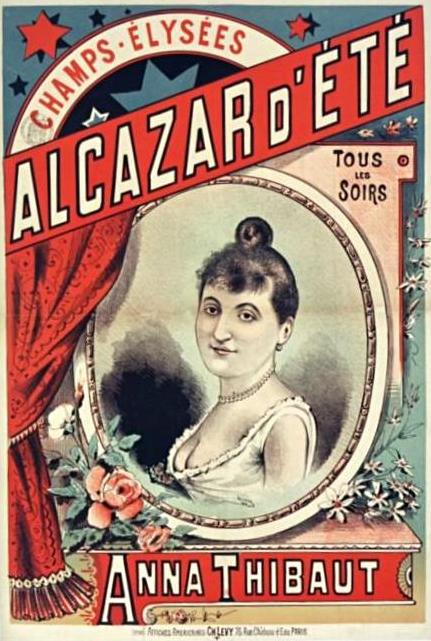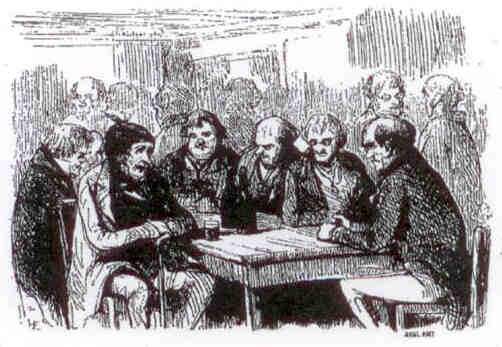|
Anna Thibaud
Anna Thibaud (14 December 1861Acte de naissance n°37, page 49/263, série du greffe: naissances, mariages, décès, publications de mariage (3E/6558) – 18 April 1948décès 1948, mairie du 17e, acte n°808, Archives Départementales de Paris, cote 17D 282) was a French singer. She had a wide repertoire, attractive stage presence and excellent voice. She performed at important venues in Paris during a lengthy career. Life Birth There is confusion about her date of birth. François Thibaudot, shoemaker, married Josephine Breton on November 6, 1850, in Saint-Aubin, Jura. From this wedding was born a first Marie-Louise Thibaudot on December 14, 1861. Josephine Breton died on August 12, 1865, in Saint-Aubin. Widowed, François then married Anne Renaud on 7 November 1866 in the same town. From this marriage was born a second Marie-Louise Thibaudot on July 30, 1867: She married on September 3, 1887, at the town hall of the 7th arrondissement of Paris with a sales representative nam ... [...More Info...] [...Related Items...] OR: [Wikipedia] [Google] [Baidu] |
Saint-Aubin, Jura
Saint-Aubin () is a village and commune in the Jura department in the Bourgogne-Franche-Comté region in eastern France France (), officially the French Republic ( ), is a country primarily located in Western Europe. It also comprises of Overseas France, overseas regions and territories in the Americas and the Atlantic Ocean, Atlantic, Pacific Ocean, Pac .... It is the birthplace of the noted singer Anna Thibaud (1861–1948). Population See also * Communes of the Jura department References Communes of Jura (department) {{JuraFR-geo-stub ... [...More Info...] [...Related Items...] OR: [Wikipedia] [Google] [Baidu] |
Les Invalides
The Hôtel des Invalides ( en, "house of invalids"), commonly called Les Invalides (), is a complex of buildings in the 7th arrondissement of Paris, France, containing museums and monuments, all relating to the military history of France, as well as a hospital and a retirement home for war veterans, the building's original purpose. The buildings house the Musée de l'Armée, the military museum of the Army of France, the Musée des Plans-Reliefs, and the Musée d'Histoire Contemporaine. The complex also includes the former hospital chapel, now national cathedral of the French military, and the adjacent former Royal Chapel known as the , the tallest church building in Paris at a height of 107 meters. The latter has been converted into a shrine of some of France's leading military figures, most notably the Napoleon's tomb, tomb of Napoleon. History Louis XIV of France, Louis XIV initiated the project by an order dated 24 November 1670, as a home and hospital for aged and di ... [...More Info...] [...Related Items...] OR: [Wikipedia] [Google] [Baidu] |
1948 Deaths
Events January * January 1 ** The General Agreement on Tariffs and Trade (GATT) is inaugurated. ** The Constitution of New Jersey (later subject to amendment) goes into effect. ** The railways of Britain are nationalized, to form British Railways. * January 4 – Burma gains its independence from the United Kingdom, becoming an independent republic, named the ''Union of Burma'', with Sao Shwe Thaik as its first President, and U Nu its first Prime Minister. * January 5 ** Warner Brothers shows the first color newsreel (''Tournament of Roses Parade'' and the ''Rose Bowl Game''). ** The first Kinsey Reports, Kinsey Report, ''Sexual Behavior in the Human Male'', is published in the United States. * January 7 – Mantell UFO incident: Kentucky Air National Guard pilot Thomas Mantell crashes while in pursuit of an unidentified flying object. * January 12 – Mahatma Gandhi begins his fast-unto-death in Delhi, to stop communal violence during the Partition of India. * ... [...More Info...] [...Related Items...] OR: [Wikipedia] [Google] [Baidu] |
1861 Births
Statistically, this year is considered the end of the whale oil industry and (in replacement) the beginning of the petroleum oil industry. Events January–March * January 1 ** Benito Juárez captures Mexico City. ** The first steam-powered carousel is recorded, in Bolton, England. * January 2 – Friedrich Wilhelm IV of Prussia dies, and is succeeded by Wilhelm I. * January 3 – American Civil War: Delaware votes not to secede from the Union. * January 9 – American Civil War: Mississippi becomes the second state to secede from the Union. * January 10 – American Civil War: Florida secedes from the Union. * January 11 – American Civil War: Alabama secedes from the Union. * January 12 – American Civil War: Major Robert Anderson sends dispatches to Washington. * January 19 – American Civil War: Georgia secedes from the Union. * January 21 – American Civil War: Jefferson Davis resigns from the United States Senate ... [...More Info...] [...Related Items...] OR: [Wikipedia] [Google] [Baidu] |
Yvette Guilbert
Yvette Guilbert (; born Emma Laure Esther Guilbert, 20 January 1865 – 3 February 1944) was a French cabaret singer and actress of the ''Belle Époque''. Biography Born in Paris into a poor family as Emma Laure Esther Guilbert, Guilbert began singing as a child but at age sixteen worked as a model at the Printemps department store in Paris. She was discovered by a journalist. She took acting and diction lessons, which enabled her in 1886 to appear on stage at several smaller venues. Guilbert debuted at the Variette Theatre in 1888. She eventually sang at the popular Eldorado club, then at the Jardin de Paris before headlining in Montmartre at the Moulin Rouge in 1890. The English painter William Rothenstein described this performance in his first volume of memoirs: One evening Lautrec came up to the rue Ravignan to tell us about a new singer, a friend of Xanrof, who was to appear at the Moulin Rouge for the first time... We went; a young girl appeared, of virginal aspect, ... [...More Info...] [...Related Items...] OR: [Wikipedia] [Google] [Baidu] |
Anna Thibaud - Alcazar D'Eté C
Anna may refer to: People Surname and given name * Anna (name) Mononym * Anna the Prophetess, in the Gospel of Luke * Anna (wife of Artabasdos) (fl. 715–773) * Anna (daughter of Boris I) (9th–10th century) * Anna (Anisia) (fl. 1218 to 1221) * Anna of Poland, Countess of Celje (1366–1425) * Anna of Cilli (1386–1416) * Anna, Grand Duchess of Lithuania (died 1418) * Anne of Austria, Landgravine of Thuringia (1432–1462) * Anna of Nassau-Dillenburg (died 1514) * Anna, Duchess of Prussia (1576–1625) * Anna of Russia (1693–1740) * Anna, Lady Miller (1741–1781) * Anna Russell, Duchess of Bedford (1783–1857) * Anna, Lady Barlow (1873–1965) * Anna (feral child) (1932–1942) * Anna (singer) (born 1987) Places Australia * Hundred of Anna, a cadastral district in South Australia Iran * Anna, Fars, a village in Fars Province * Anna, Kohgiluyeh and Boyer-Ahmad, a village in Kohgiluyeh and Boyer-Ahmad Province Russia * Anna, Voronezh Oblast, an urban locality in Vorone ... [...More Info...] [...Related Items...] OR: [Wikipedia] [Google] [Baidu] |
Goguette
A Goguette was a singing society in France and Belgium, and its members were called ''goguettiers''. As well as providing venues for informal solo and ensemble singing, goguettes also served as places for drinking, socialising, and recreation. Goguettes can trace their history back to 1729 and the "''Société du Caveau''" in Paris, founded by poet and chansonnier Pierre Gallet (1698–1757), but their heyday was in the years 1818–1900. They can still be found today. In the early 19th century, goguettes met in the premises of cafés and restaurants, and provide a space for their members (for a small fee) to sing in public or to have their own compositions sung. Songs would explore well-worn epicurean themes such as drinking and eating, though political and social songs also played an important part. Open to all social ranks, in practice they tended to attract literate men from the artisan class; they were also associated with revolutionary politics and were carefully monitored b ... [...More Info...] [...Related Items...] OR: [Wikipedia] [Google] [Baidu] |
Val-de-Grâce
The (' or ') was a military hospital located at in the 5th arrondissement of Paris, France. It was closed as a hospital in 2016. History The church of the was built by order of Queen Anne of Austria, wife of Louis XIII. After the birth of her son Louis XIV, Anne (previously childless after 23 years of marriage) showed her gratitude to the Virgin Mary by building a church on the land of a Benedictine convent. Louis XIV himself is said to have laid the cornerstone for the in a ceremony that took place April 1, 1645, when he was seven years old. The church of the Val-de-Grâce, designed by and , is considered by some as Paris's best example of baroque architecture (curving lines, elaborate ornamentation, and harmony of different elements). Construction began in 1645, and was completed in 1667. The Benedictine nuns provided medical care for injured revolutionaries during the French Revolution, and thus the church at was spared much of the desecration and vandalism that pla ... [...More Info...] [...Related Items...] OR: [Wikipedia] [Google] [Baidu] |
Rhineland
The Rhineland (german: Rheinland; french: Rhénanie; nl, Rijnland; ksh, Rhingland; Latinised name: ''Rhenania'') is a loosely defined area of Western Germany along the Rhine, chiefly its middle section. Term Historically, the Rhinelands refers (physically speaking) to a loosely defined region embracing the land on the banks of the Rhine in Central Europe, which were settled by Ripuarian and Salian Franks and became part of Frankish Austrasia. In the High Middle Ages, numerous Imperial States along the river emerged from the former stem duchy of Lotharingia, without developing any common political or cultural identity. A "Rhineland" conceptualization can be traced to the period of the Holy Roman Empire from the sixteenth until the eighteenth centuries when the Empire's Imperial Estates (territories) were grouped into regional districts in charge of defence and judicial execution, known as Imperial Circles. Three of the ten circles through which the Rhine flowed r ... [...More Info...] [...Related Items...] OR: [Wikipedia] [Google] [Baidu] |




